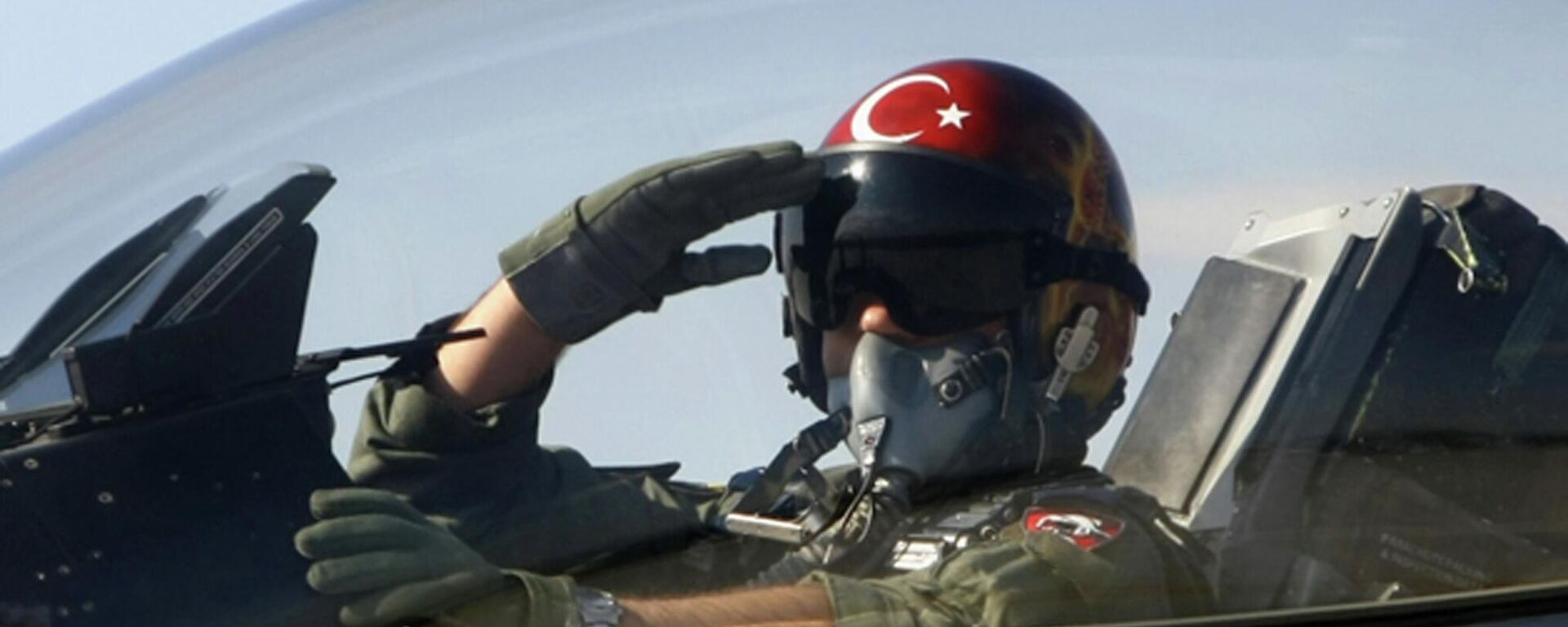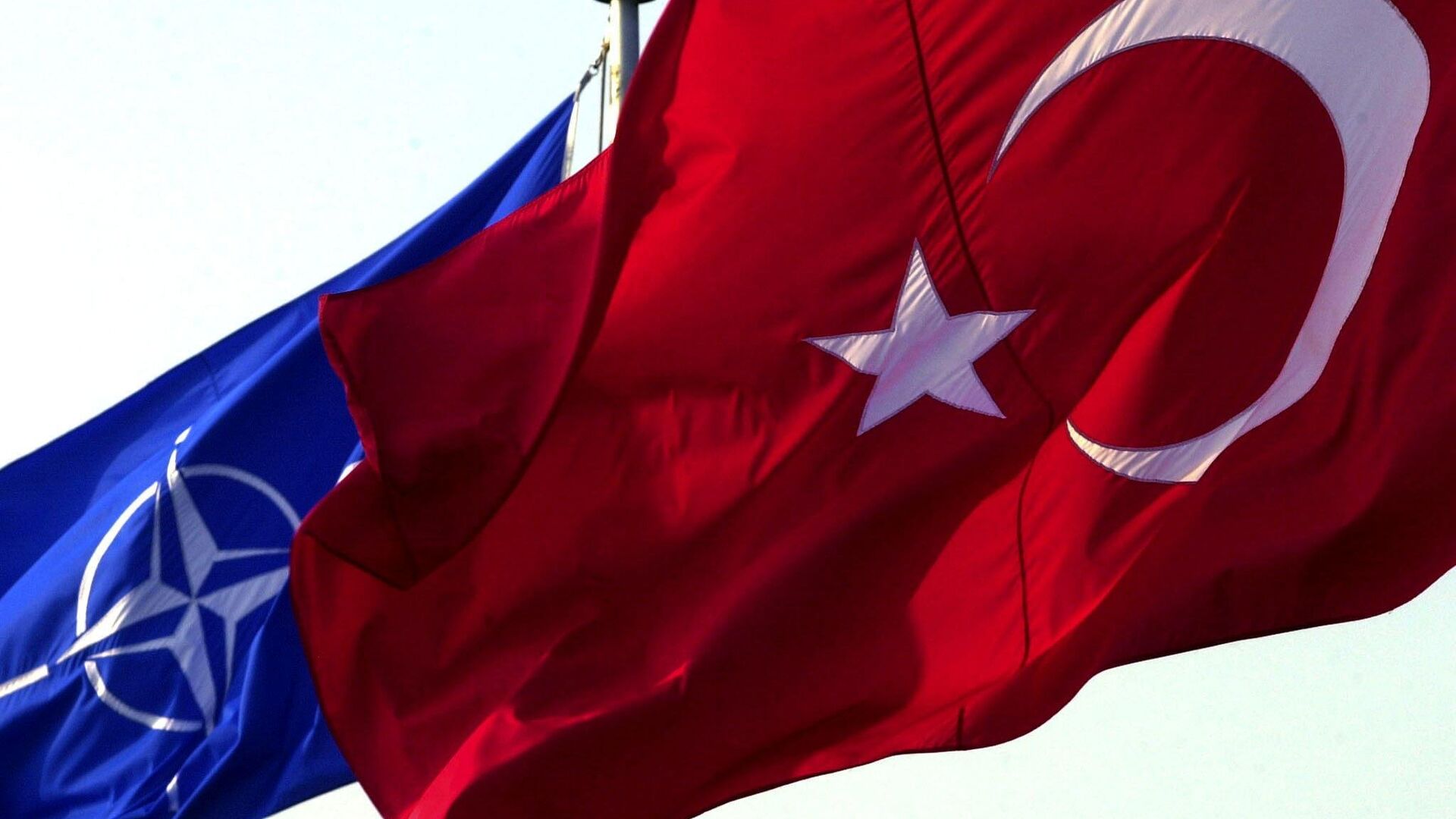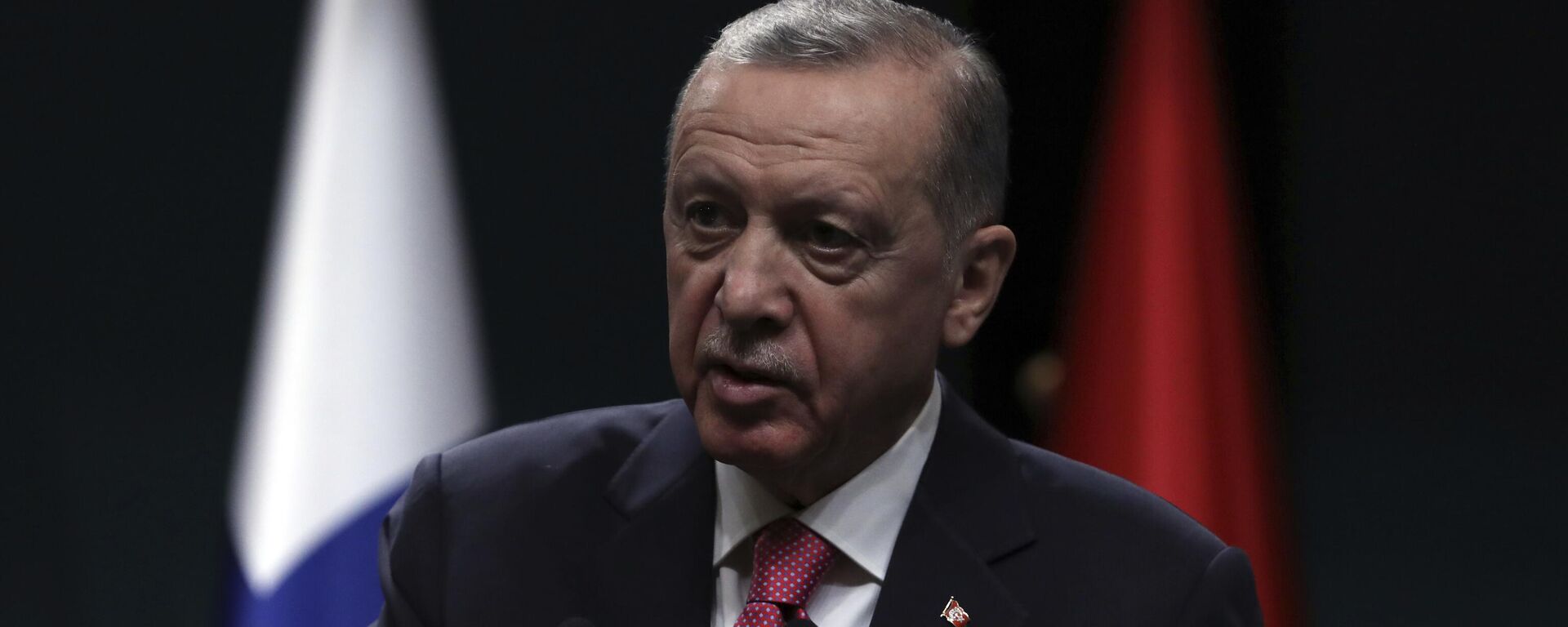https://sputnikglobe.com/20230405/natos-enlargement-targets-not-only-moscow-but-ankara-as-well-turkish-media-says-1109155627.html
NATO's Enlargement Targets Not Only Moscow, But Ankara as Well, Turkish Media Says
NATO's Enlargement Targets Not Only Moscow, But Ankara as Well, Turkish Media Says
Sputnik International
Turkiye’s parliament approved Finland’s bid to join the Western alliance last week, citing Helsinki’s “authentic and concrete steps” to allay Ankara’s security concerns. However, one Turkish outlet fears the nod to membership may prove a strategic mistake, and that the bloc is directed as much against Turkiye as it is against Russia.
2023-04-05T11:49+0000
2023-04-05T11:49+0000
2023-04-05T11:51+0000
world
turkiye
nato
nato expansion
finland
analysis
https://cdn1.img.sputnikglobe.com/img/104402/87/1044028738_0:107:2048:1259_1920x0_80_0_0_f165e13acde41cc79a001502005994bb.jpg
Finland officially joined NATO on Tuesday, becoming the 31st nation to join the alliance, with its accession constituting the Western military bloc’s ninth wave of expansion since its creation in 1949. Russia, which shares a 1,300+ km frontier with its Nordic neighbor, warned that Moscow would take the necessary “countermeasures” to ensure its tactical and strategic security.Turkiye’s Defense Ministry used the occasion, which coincides with the 74th anniversary of the founding of NATO, to post a congratulatory tweet. “We have been a distinguished member of NATO since 1952. Happy 74th anniversary. Together we are stronger,” the ministry wrote, adding the hashtag “#WeAreNATO.”But the celebration may be premature, writes Turkish newspaper Aydinlik.“Although NATO’s enlargement has been seen as a policy of containing Russia, it is now obvious that Turkiye is being similarly besieged. In the past, the Atlantic [powers] attempted to establish global hegemony by hemming the Eurasian continent in on land, in accordance with Spykman’s Rimland theory, therefore including countries such as Turkiye, Iran, Afghanistan and China in its geopolitical axis,” the newspaper, affiliated with Turkiye’s Vatan Partisi, a left Kemalist party, wrote in an analysis published Tuesday.Turkiye vs NATOAydinlik’s analysis is in line with growing anti-NATO and anti-Western sentiment in Turkiye. A 2019 poll found that only 21 percent of Turks had a positive view of the alliance. A 2021 survey discovered that a whopping 90.3 percent didn’t believe that the bloc would come to the country’s assistance in a crisis, while 51.7 percent said the bloc “exploits” Turkiye for its own interests. Another poll in early 2022 found that 39.4 percent of Turks would prefer it if their country would “give priority to Russia and China” in foreign policy, compared to 37.5 percent for the EU and the US.Turkish grievances with the West are numerous, starting with Turkiye’s shabby treatment by Brussels – which has dangled the prospect of EU membership before the country for more than 30 years, but consistently refused to allow it to enter, ostensibly for failing to “meet membership criteria.” (Meanwhile, much less developed countries in Eastern Europe have been allowed in, and even Ukraine, which is engulfed in a NATO-Russia proxy conflict and mired in corruption and poverty, is now being considered for membership.)NATO’s role in the 2016 coup attempt is another issue on many Turks’ minds. Some have accused NATO of direct involvement in the coup plot, and the Turkish government’s purge of NATO staff after the attempted putsch indicates that Ankara also suspects them.America’s sheltering of Fethullah Gulen, the Muslim cleric President Erdogan suspects of masterminding the coup attempt, has served to further fray ties. As has the scandal over the F-35 fighter program. After pumping more than a billion dollars in R&D funds into the fighter and organizing the manufacture of dozens of key components, Turkiye was unceremoniously booted out of the program in 2019 and slapped with sanctions in 2020 over its purchase of advanced Russian missile defense systems.Turkiye and NATO’s de facto leader, the United States, have also found themselves on opposite sides in Syria, where US forces have allied themselves to and shielded Kurdish militia forces which Ankara classifies as terrorists. At the same time, the ongoing standoff between Turkiye and Greece in a maritime dispute in the Mediterranean (which France, another NATO member, has joined on Athens’ side) has served to further heighten Ankara’s security concerns.Even as Turkiye prepares for presidential and parliamentary elections scheduled for May, Ankara has accused the US of meddling in the country’s internal affairs after US Ambassador Jeff Flake met with Kemal Kilicdaroglu, Erdogan’s main rival.“Joe Biden’s ambassador visits Kemal. Shame on you, think with your head. You are an ambassador. Your interlocutor here is the president. How will you stand up after that and ask for a rendezvous with the president? Our doors are closed to him, he can no longer come in. Why? He needs to know his place,” Erdogan said.With NATO’s latest expansion, the real question worth asking, Aydinlik seems to intimate, is about Turkiye’s place in the Western alliance.
https://sputnikglobe.com/20230127/nato-biggest-threat-to-turkeys-independence-and-sovereignty-turkish-observers-say-1106758265.html
https://sputnikglobe.com/20230403/erdogan-says-his-doors-closed-to-us-ambassador-in-ankara-1109060565.html
turkiye
finland
Sputnik International
feedback@sputniknews.com
+74956456601
MIA „Rossiya Segodnya“
2023
News
en_EN
Sputnik International
feedback@sputniknews.com
+74956456601
MIA „Rossiya Segodnya“
Sputnik International
feedback@sputniknews.com
+74956456601
MIA „Rossiya Segodnya“
turkiye, nato, alliance, expansion, threat, danger, analysis, axis
turkiye, nato, alliance, expansion, threat, danger, analysis, axis
NATO's Enlargement Targets Not Only Moscow, But Ankara as Well, Turkish Media Says
11:49 GMT 05.04.2023 (Updated: 11:51 GMT 05.04.2023) Turkiye’s parliament approved Finland’s bid to join the Western alliance last week, citing Helsinki’s “authentic and concrete steps” to allay Ankara’s security concerns. However, one Turkish outlet fears the nod to membership may prove a strategic mistake, and that the bloc is directed as much against Turkiye as it is against Russia.
Finland officially joined NATO on Tuesday, becoming the 31st nation to join the alliance, with its accession constituting the Western military bloc’s ninth wave of expansion since its creation in 1949. Russia, which shares a 1,300+ km frontier with its Nordic neighbor, warned that Moscow would take the necessary
“countermeasures” to ensure its tactical and strategic security.
Turkiye’s Defense Ministry used the occasion, which coincides with the 74th anniversary of the founding of NATO, to post a
congratulatory tweet. “We have been a distinguished member of NATO since 1952. Happy 74th anniversary. Together we are stronger,” the ministry wrote, adding the hashtag “#WeAreNATO.”
But the celebration may be premature, writes Turkish newspaper Aydinlik.
“Although NATO’s enlargement has been seen as a policy of containing Russia, it is now obvious that Turkiye is being similarly besieged. In the past, the Atlantic [powers] attempted to establish global hegemony by hemming the Eurasian continent in on land, in accordance with Spykman’s Rimland theory, therefore including countries such as Turkiye, Iran, Afghanistan and China in its geopolitical axis,” the newspaper, affiliated with Turkiye’s Vatan Partisi, a left Kemalist party, wrote in an
analysis published Tuesday.
From the 1970s on, the geopolitical situation began to shift, Aydinlik noted. “Among the trusted countries, Iran escaped America’s control in 1979, China after 1990, Turkiye on July 15, 2016 [the day of the attempted coup against Erdogan, ed.] and Afghanistan in 2021, becoming target countries. Therefore, the geopolitical axis was broken, and shifted to Greece, southern Cyprus and Israel. Thus, Turkiye was cut off from the Atlantic [axis], and pushed toward the Heartland, and is now besieged from Alexandropoulos to Crete, and from there to the eastern Mediterranean and northern Syria.”
Aydinlik’s analysis is in line with growing anti-NATO and anti-Western sentiment in Turkiye. A 2019 poll found that
only 21 percent of Turks had a positive view of the alliance. A 2021 survey discovered that a whopping
90.3 percent didn’t believe that the bloc would come to the country’s assistance in a crisis, while 51.7 percent said the bloc “exploits” Turkiye for its own interests. Another poll in early 2022 found that
39.4 percent of Turks would prefer it if their country would “give priority to Russia and China” in foreign policy, compared to 37.5 percent for the EU and the US.
Turkish grievances with the West are numerous, starting with Turkiye’s shabby treatment by Brussels – which has dangled the prospect of EU membership before the country for more than 30 years, but consistently refused to allow it to enter, ostensibly for failing to “meet membership criteria.” (Meanwhile, much less developed countries in Eastern Europe have been allowed in, and even Ukraine, which is engulfed in a NATO-Russia proxy conflict and mired in corruption and poverty, is now being considered for membership.)
NATO’s role in the 2016 coup attempt is another issue on many Turks’ minds. Some have accused NATO of direct involvement in the coup plot, and the Turkish government’s
purge of NATO staff after the attempted putsch indicates that Ankara also suspects them.
America’s sheltering of Fethullah Gulen, the Muslim cleric President Erdogan suspects of masterminding the coup attempt, has served to further fray ties. As has the scandal over the F-35 fighter program. After pumping more than a billion dollars in R&D funds into the fighter and organizing the manufacture of dozens of key components, Turkiye was unceremoniously booted out of the program in 2019 and slapped with sanctions in 2020 over its purchase of advanced Russian missile defense systems.

27 January 2023, 13:09 GMT
Turkiye and NATO’s de facto leader, the United States, have also found themselves on opposite sides in Syria, where US forces have allied themselves to and shielded Kurdish militia forces which Ankara classifies as terrorists. At the same time, the ongoing standoff between Turkiye and Greece in a maritime dispute in the Mediterranean (which France, another NATO member, has joined on Athens’ side) has served to further heighten Ankara’s security concerns.
Even as Turkiye prepares for presidential and parliamentary elections scheduled for May, Ankara has accused the US of meddling in the country’s internal affairs after US Ambassador Jeff Flake met with Kemal Kilicdaroglu, Erdogan’s main rival.
“Joe Biden’s ambassador visits Kemal. Shame on you, think with your head. You are an ambassador. Your interlocutor here is the president. How will you stand up after that and ask for a rendezvous with the president? Our doors are closed to him, he can no longer come in. Why? He needs to know his place,” Erdogan said.
With NATO’s latest expansion, the real question worth asking, Aydinlik seems to intimate, is about Turkiye’s place in the Western alliance.




